“Many are the afflictions of the righteous, but the LORD delivers him out of them all.” (Psalm 34:19). “But if it is from God, you will not be able to stop them…; you will only find yourselves fighting against God.” (Acts 5:39) Fear of the LORD brings freedom from FEAR!
How many of you actually read the whole bulletin? Pastor Gail added a quote from The Pilgrim’s Song Book that seems to fit so well with today’s Scripture portion. It was like God was giving us a primer to focus our thoughts on throughout the week.
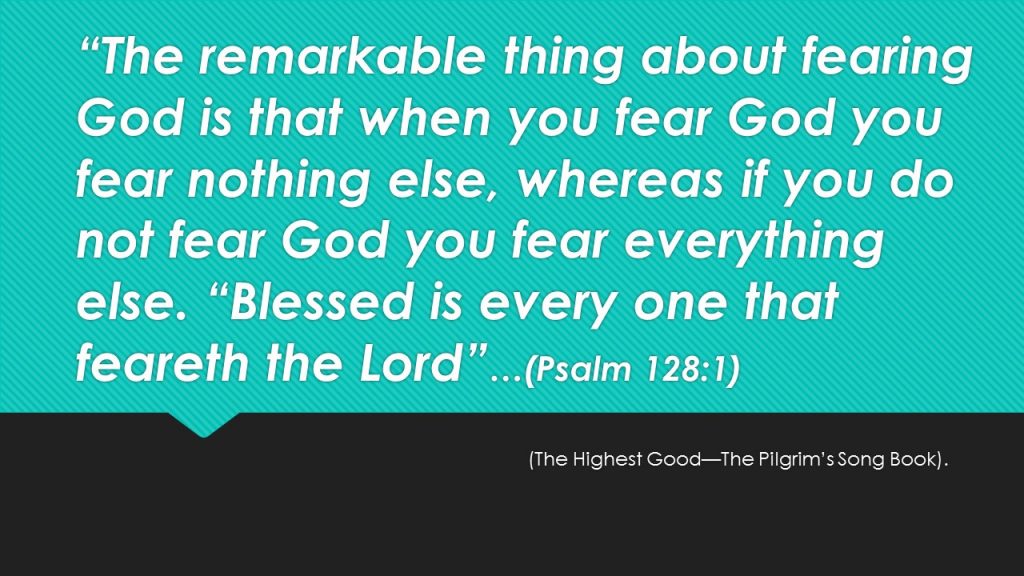 The quote was, “The remarkable thing about fearing God is that when you fear God you fear nothing else, whereas if you do not fear God you fear everything else. “Blessed is every one that feareth the Lord”;… (The Highest Good—The Pilgrim’s Song Book).
The quote was, “The remarkable thing about fearing God is that when you fear God you fear nothing else, whereas if you do not fear God you fear everything else. “Blessed is every one that feareth the Lord”;… (The Highest Good—The Pilgrim’s Song Book).
The Bible quote on the end is from Psalm 128, one of the Psalms of Ascent that Israel would recite as they made their way up to Jerusalem to celebrate the Passover and other feasts. Or perhaps as some scholars claim, these were sung by the Levites as they ascended the fifteen steps in the Temple. Either way it was a Psalm of one on a journey to meet with God.
Psalm 128 tells us that not only is the fear of the Lord helpful to prevent other fears from overwhelming us but there are many blessings that one receives when their heart knows “the fear of the Lord”.
 “Blessed are all who fear the LORD, who walk in his ways. You will eat the fruit of your labor; blessings and prosperity will be yours. Your wife will be like a fruitful vine within your house; your sons will be like olive shoots around your table. Thus is the man blessed who fears the LORD. May the LORD bless you from Zion all the days of your life; may you see the prosperity of Jerusalem, and may you live to see your children’s children. Peace be upon Israel.” Psalm 128:1-6 (NIV)
“Blessed are all who fear the LORD, who walk in his ways. You will eat the fruit of your labor; blessings and prosperity will be yours. Your wife will be like a fruitful vine within your house; your sons will be like olive shoots around your table. Thus is the man blessed who fears the LORD. May the LORD bless you from Zion all the days of your life; may you see the prosperity of Jerusalem, and may you live to see your children’s children. Peace be upon Israel.” Psalm 128:1-6 (NIV)
Seems to me that the blessings of fearing God outweigh the supposed freedom of following in one’s stubborn ways do they not? The blessings are both material and spiritual in nature. Blessings include, “eating the fruit of your labour” (2), “a growing family with an enjoyable home life” (3), “travel” (5), “and even greater longevity” (6).
But did you notice it doesn’t promise a life of ease or leisure? Or suggest in any way that those who fear the Lord need not work nor should they sit around with hands wide open waiting for the blessings to fall from heaven? Instead they learn to walk in His ways. But just how does one learn the fear of the Lord that the Psalmist proclaims as such a good thing?
Perhaps today’s passage in HIStory can help us to understand that God uses both the good times and the not so good times to teach us to fear and trust in Him.
So if you have your Bible with you turn with me to Exodus 14 and we’ll pick up where we left off two weeks ago when we looked at learning lessons the hard way. Exodus 14:19-31 (NIV)
“19 Then the angel of God, who had been traveling in front of Israel’s army, withdrew and went behind them. The pillar of cloud also moved from in front and stood behind them, 20 coming between the armies of Egypt and Israel. Throughout the night the cloud brought darkness to the one side and light to the other side; so neither went near the other all night long. 21 Then Moses stretched out his hand over the sea, and all that night the LORD drove the sea back with a strong east wind and turned it into dry land. The waters were divided, 22 and the Israelites went through the sea on dry ground, with a wall of water on their right and on their left. 23 The Egyptians pursued them, and all Pharaoh’s horses and chariots and horsemen followed them into the sea. 24 During the last watch of the night the LORD looked down from the pillar of fire and cloud at the Egyptian army and threw it into confusion.
25 He made the wheels of their chariots come off so that they had difficulty driving. And the Egyptians said, “Let’s get away from the Israelites! The LORD is fighting for them against Egypt.” 26 Then the LORD said to Moses, “Stretch out your hand over the sea so that the waters may flow back over the Egyptians and their chariots and horsemen.” 27 Moses stretched out his hand over the sea, and at daybreak the sea went back to its place. The Egyptians were fleeing toward it, and the LORD swept them into the sea. 28 The water flowed back and covered the chariots and horsemen–the entire army of Pharaoh that had followed the Israelites into the sea. Not one of them survived. 29 But the Israelites went through the sea on dry ground, with a wall of water on their right and on their left. 30 That day the LORD saved Israel from the hands of the Egyptians, and Israel saw the Egyptians lying dead on the shore. 31 And when the Israelites saw the great power the LORD displayed against the Egyptians, the people feared the LORD and put their trust in him and in Moses his servant.” Exodus 14:19-31 (NIV)
In modern military and policing terms when one is “on point” it means they are out front, closest to danger and usually the most exposed. This is not usually the coveted position as it comes with the most risk. But some people actually like the point position because they get to lead the way.
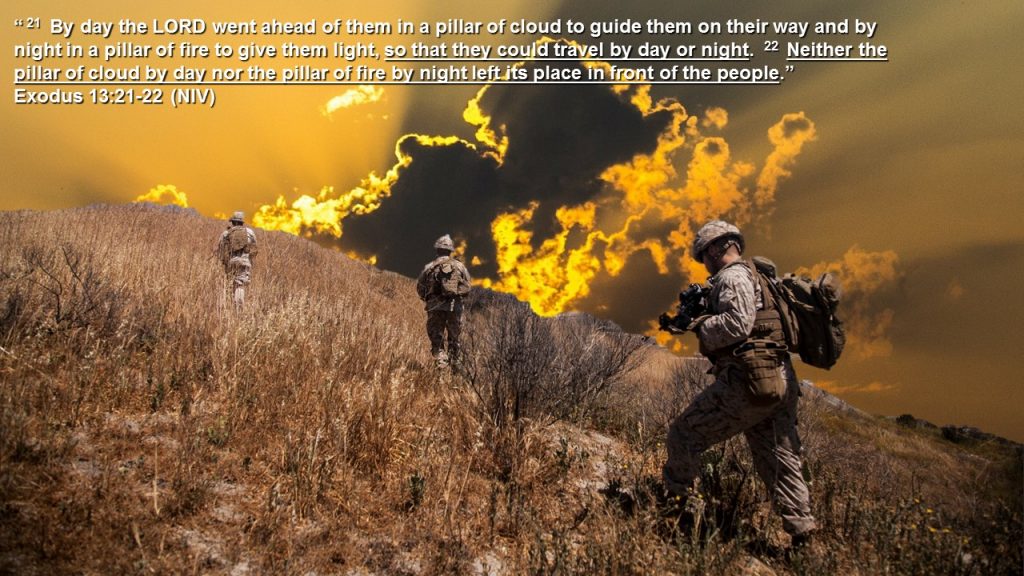 On exercises with the reserves I was never “on point”. I was a rather large easily spotted target. So it wouldn’t be the best position to have me in and yet I mostly found myself in the position just back of point. In a sense I would have the back of the point person because as the radio man I could call in support when I saw him in trouble. Otherwise my job was to let the mission commander know what the point was up to. Providing I could actually see him that is. A good point tried to blend into his surroundings and was quite stealth so I would need to follow close enough to know where he was going but far enough to be able to radio or signal for back up.
On exercises with the reserves I was never “on point”. I was a rather large easily spotted target. So it wouldn’t be the best position to have me in and yet I mostly found myself in the position just back of point. In a sense I would have the back of the point person because as the radio man I could call in support when I saw him in trouble. Otherwise my job was to let the mission commander know what the point was up to. Providing I could actually see him that is. A good point tried to blend into his surroundings and was quite stealth so I would need to follow close enough to know where he was going but far enough to be able to radio or signal for back up.
From the moment they left Egypt and crossed the dessert God’s angel was the point person (cf. Exodus 13:21). Exodus 13:21-22 (NIV) “ 21 By day the LORD went ahead of them in a pillar of cloud to guide them on their way and by night in a pillar of fire to give them light, so that they could travel by day or night. 22 Neither the pillar of cloud by day nor the pillar of fire by night left its place in front of the people.” And He was a rather unusual point at that. There was no stealth in Him! He raised a cloud of smoke by day and a pillar of fire by night so that everyone following knew exactly where he was and what direction they needed to go. However, when the time came to cross the Red Sea, God’s point moved from the front to the rear of the procession. He went from leading them to the promise land to having their back along the way.
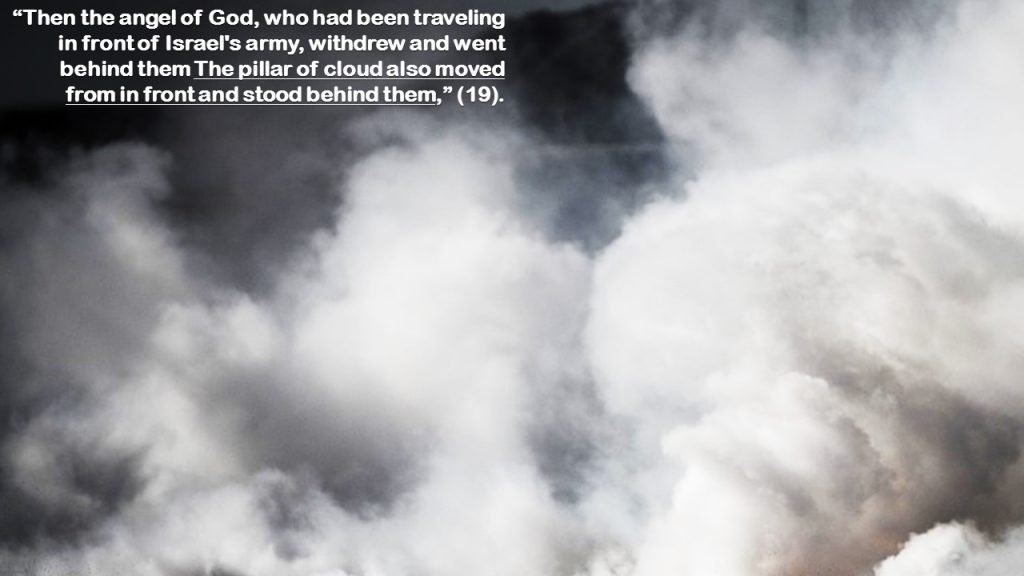 In fact He became a huge distraction for the forces of Pharaoh so that as Moses stretched out his staff and parted the Red Sea the way was clear for Israel to proceed. God placed Himself between the enemy and the promised land. Between Pharaoh and Israel.
In fact He became a huge distraction for the forces of Pharaoh so that as Moses stretched out his staff and parted the Red Sea the way was clear for Israel to proceed. God placed Himself between the enemy and the promised land. Between Pharaoh and Israel.
The same can be said about Jesus and what He did on the cross. The enemy that was pursuing us; would in fact catch up and over take us without the intervention of our Saviour. So Christ stepped in when mankind was in eternal danger and prevented the devil from winning the war.
Think about that for a moment. “Moses said, “20 …Throughout the night the cloud brought darkness to the one side and light to the other side; so neither went near the other all night long”.
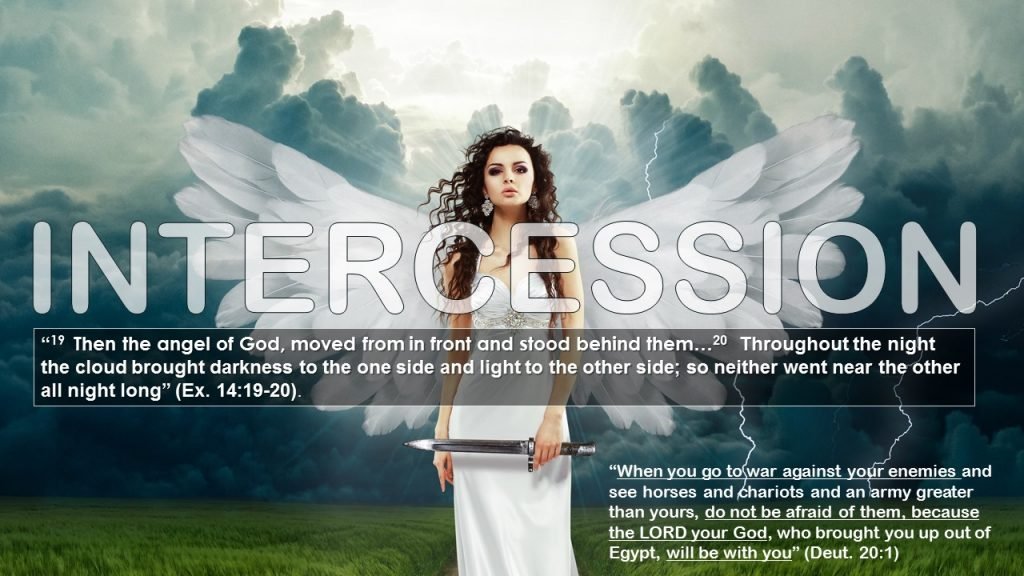 God literally stepped in separating His chosen ones from their greatest fear as well as closest physical threat. And He did this even after they had grumbled and complained to Moses about having brought them to die in the dessert.
God literally stepped in separating His chosen ones from their greatest fear as well as closest physical threat. And He did this even after they had grumbled and complained to Moses about having brought them to die in the dessert.
This stepping between is what we call intercession of biblical proportions! It is coming between the treat and the target for the benefit of the target. The Bible says, “…Christ Jesus who died–more than that, who was raised to life–is at the right hand of God and is also interceding for us” (Rom. 8:34). Elsewhere is says, “For Christ did not enter a sanctuary made with human hands that was only a copy of the true one; he entered heaven itself, now to appear for us in God’s presence” (Heb. 9:24). Jesus has our back. And if God has our back, whom then shall we fear?
Look how far God went to prove this to them! After giving Israel all night to cross the Sea on dry land God stepped out of the way of Pharaoh knowing that his stubborn pride hadn’t taken the hint.
Again think about this for a moment. All night long this massive cloud was preventing them from pursuing Israel. All night long! Up to that point I believe Pharaoh could have presumably repented and turned around with His armies and they would have escaped with their lives. But pride goes before a fall and a haughty spirit before destruction (Prov.16:18)
10 times Pharaoh had been warned by God’s mouthpiece to let the chosen people go. Each time the signs and wonders increased in severity and each time Pharaoh chose to stubbornly ignore God.
The Apostle Peter reminds us, “The Lord is …is patient with you, not wanting anyone to perish, but everyone to come to repentance” (2 Peter. 3:9). But there does come a time when the cup of inequity spills over and justice takes the shape of the Lord’s wrath.
You and I never want to find out where that line is, amen? That’s why it is wise to fear God and heed his warnings.
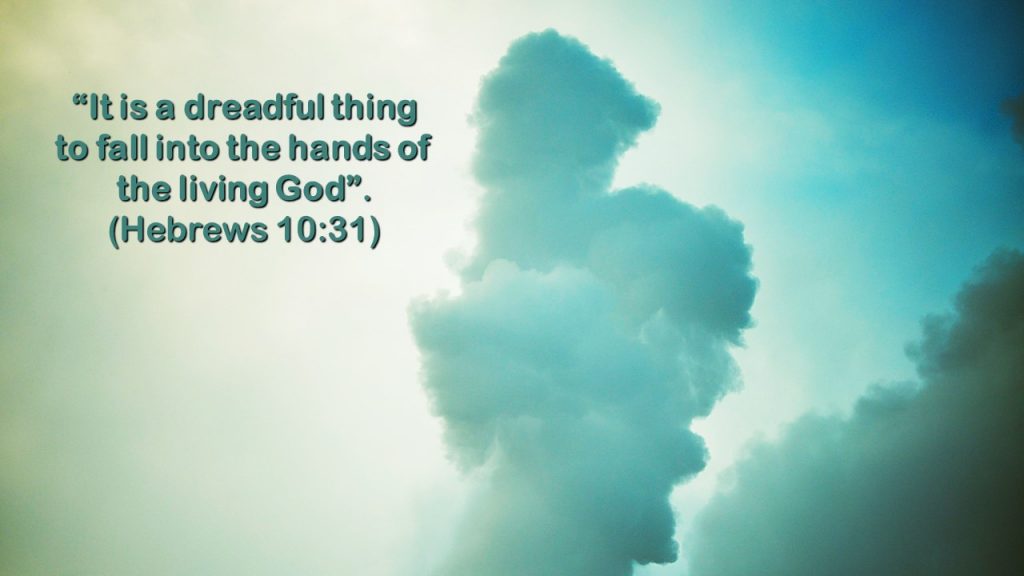 Moses tells us that, “ 23 The Egyptians pursued them, and all Pharaoh’s horses and chariots and horsemen followed them into the sea”. Perhaps they thought with their superior technology that they could catch up to and overpower Israel. But I mean really? Had they not noticed the walls of water on both sides of them? Remember we’re not talking about a little bit of water here. It says they went down into the sea! And if the place where scientists found the remains is accurate that sea was very deep.
Moses tells us that, “ 23 The Egyptians pursued them, and all Pharaoh’s horses and chariots and horsemen followed them into the sea”. Perhaps they thought with their superior technology that they could catch up to and overpower Israel. But I mean really? Had they not noticed the walls of water on both sides of them? Remember we’re not talking about a little bit of water here. It says they went down into the sea! And if the place where scientists found the remains is accurate that sea was very deep.
Not only that but look what happens when God gets ticked! “24 During the last watch of the night the LORD looked down from the pillar of fire and cloud at the Egyptian army and threw it into confusion.
25 He made the wheels of their chariots come off so that they had difficulty driving.” There is plenty of speculation as to what those Egyptians saw, but Hebrews 10:31 says, “It is a dreadful thing to fall into the hands of the living God”. So whatever they saw must have struck terror into their hearts.
We know it did because the next thing we are told is:“…the Egyptians said, “Let’s get away from the Israelites! The LORD is fighting for them against Egypt.” (25).
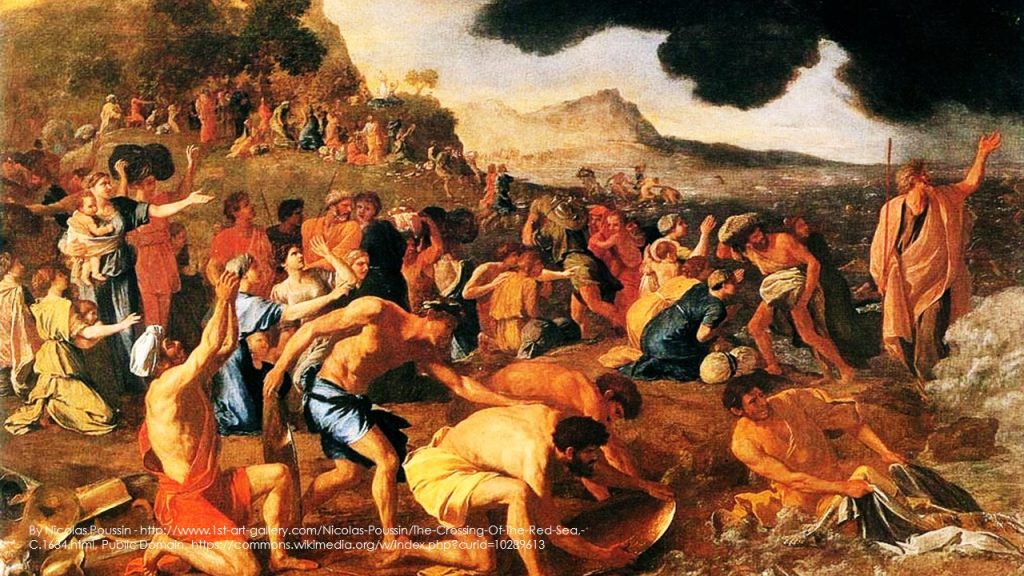 Oh that they had come to that realization on the banks of the Red Sea. Better yet, if they had stayed home and mourned their first born children. There is a point where repentance will no longer cut it. Where a hard heart reaps its reward. Unfortunately, those who refuse to learn from Pharaoh’s mistakes eventually find out the hard way just how wrong it is not to fear God. Sometimes as a Pastor you meet people who seem to think tomorrow is a good time to get right with God. Tomorrow they’ll follow His call. Tomorrow they’ll repent of their wrong doings and trust in God. But this, like every tragedy in life, is a reminder that you don’t always get to tomorrow.
Oh that they had come to that realization on the banks of the Red Sea. Better yet, if they had stayed home and mourned their first born children. There is a point where repentance will no longer cut it. Where a hard heart reaps its reward. Unfortunately, those who refuse to learn from Pharaoh’s mistakes eventually find out the hard way just how wrong it is not to fear God. Sometimes as a Pastor you meet people who seem to think tomorrow is a good time to get right with God. Tomorrow they’ll follow His call. Tomorrow they’ll repent of their wrong doings and trust in God. But this, like every tragedy in life, is a reminder that you don’t always get to tomorrow.
And it doesn’t matter what station in life you may find yourself in. Surely after losing his only son, Pharaoh would have seen the walls of water and chose to withdraw from this foolishness. But Psalm, 136:15 says, “that water swept Pharaoh and his army into the Red Sea…”. It was over before they could get started.
God had Israel’s back! As Moses hand waved over the sea the waters lashed out and everyone in them drown. Verse 28 says, “…not one survived”. Not one!
If that doesn’t instill the fear of God’s wrath in you then your heart is in grave danger! You should stop whatever you are doing right now and cry out for God’s mercy. For God has provided a way to soften hearts of stone in those clay vessels and restore hearts of flesh.
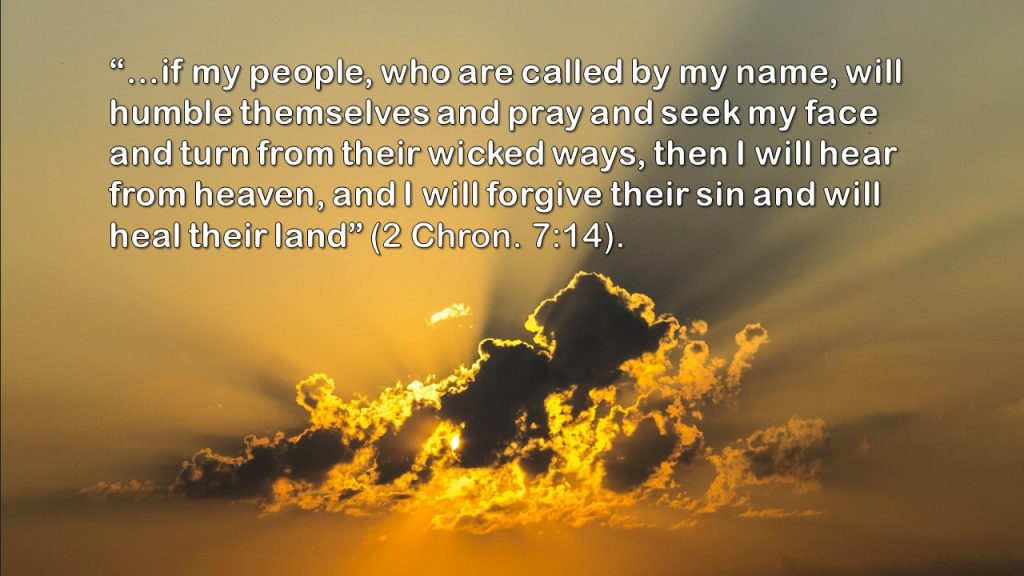 God told Ezra to write, “…if my people, who are called by my name, will humble themselves and pray and seek my face and turn from their wicked ways, then I will hear from heaven, and I will forgive their sin and will heal their land” (2 Chron. 7:14).
God told Ezra to write, “…if my people, who are called by my name, will humble themselves and pray and seek my face and turn from their wicked ways, then I will hear from heaven, and I will forgive their sin and will heal their land” (2 Chron. 7:14).
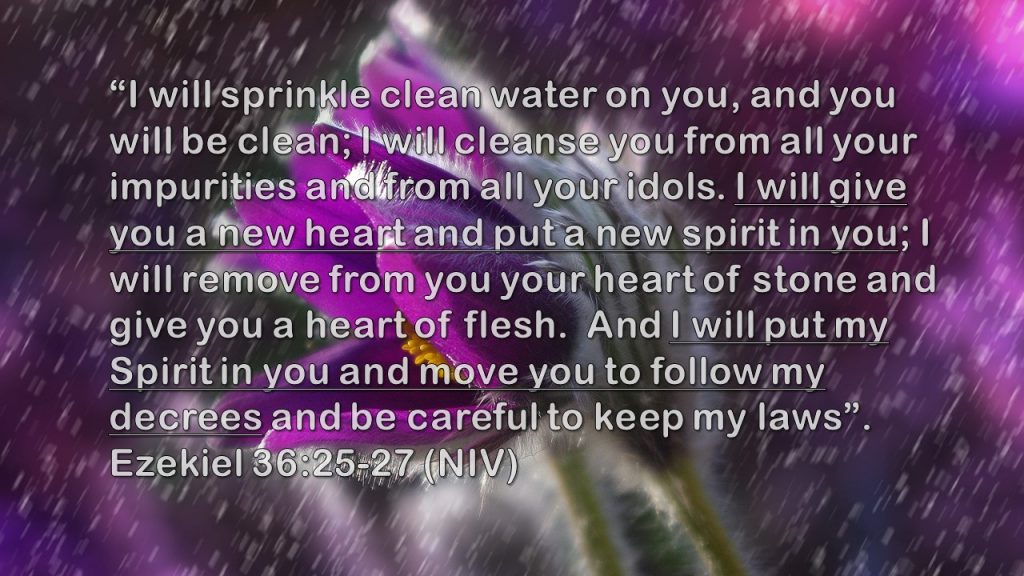 He told Ezekiel the prophet, “25 I will sprinkle clean water on you, and you will be clean; I will cleanse you from all your impurities and from all your idols. 26 I will give you a new heart and put a new spirit in you; I will remove from you your heart of stone and give you a heart of flesh. 27 And I will put my Spirit in you and move you to follow my decrees and be careful to keep my laws”. Ezekiel 36:25-27 (NIV)
He told Ezekiel the prophet, “25 I will sprinkle clean water on you, and you will be clean; I will cleanse you from all your impurities and from all your idols. 26 I will give you a new heart and put a new spirit in you; I will remove from you your heart of stone and give you a heart of flesh. 27 And I will put my Spirit in you and move you to follow my decrees and be careful to keep my laws”. Ezekiel 36:25-27 (NIV)
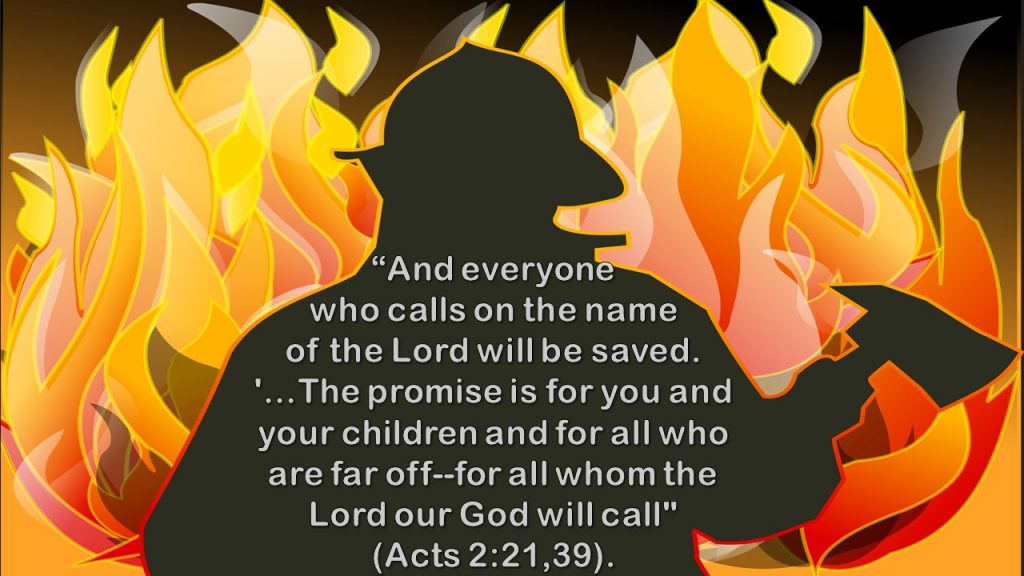 When a firefighter enters a room engulfed in smoke and flames he will yell out, “Firefighter call out” and listen for those trapped in that dangerous place. “Firefighter call out!”. They announce themselves and their ability to save. If a person won’t and can’t call out, they will surely perish. But if someone does answer the call, the firefighter reaches out, risks life and limp, to bring those, as good as dead, to where they can find life.
When a firefighter enters a room engulfed in smoke and flames he will yell out, “Firefighter call out” and listen for those trapped in that dangerous place. “Firefighter call out!”. They announce themselves and their ability to save. If a person won’t and can’t call out, they will surely perish. But if someone does answer the call, the firefighter reaches out, risks life and limp, to bring those, as good as dead, to where they can find life.
The Apostle Peter he promised, “And everyone who calls on the name of the Lord will be saved.’…The promise is for you and your children and for all who are far off–for all whom the Lord our God will call” (Acts 2:21,39).
 “That day the LORD saved Israel from the hands of the Egyptians, and Israel saw the Egyptians lying dead on the shore. And when the Israelites saw the great power the LORD displayed against the Egyptians, the people feared the LORD and put their trust in him and in Moses his servant” (Ex. 14:30-31). It is right here in HIStory.
“That day the LORD saved Israel from the hands of the Egyptians, and Israel saw the Egyptians lying dead on the shore. And when the Israelites saw the great power the LORD displayed against the Egyptians, the people feared the LORD and put their trust in him and in Moses his servant” (Ex. 14:30-31). It is right here in HIStory.
EBC says, “The fear of the Lord (v.31) was the signal of a responsive attitude of submission and love equivalent to putting one’s whole trust in him.” (Expositor’s Bible Commentary, The – The Expositor’s Bible Commentary – Volume 2: Genesis, Exodus, Leviticus, Numbers.) I wish the story said and they lived happily ever after. But we know that this was only the beginning of faith for them.
Faith is a journey not a destination. Even as their deliverance from Pharaoh was a part of the journey not the end of HIStory. Many of those who walked across on dry land later forgot the Lord’s kindness and perished because they chose to give into all kinds of fear rather than to fear God and find freedom.
So what fear is preventing you from the freedom that comes from fearing God?
This week’s Study Questions.
1. What do you fear the most?
2. When do you feel the most secure?
Read Exodus 14:19-31 in several translations if possible.
Read Psalm 128
1. What does it mean to fear the LORD? (Exodus 15:16; Joshua 22:24; Proverbs 29:25; Job 41:33; Matthew 14:26Psalm 11:10;34:11-14; Rom 3:18; Isaiah 8:13)
2. Who interceded on behalf of Israel? (compare Exodus 13:21-22 with 14:19-20; see also Num 20:16; Isaiah 63:8-10)
3. What mercies do we see in verse 20? (see also Prov. 4:18-19)
4. Why did Moses need to stretch out his had? (Exodus 14:21; See Exodus 14:15a, 16)
5. What happened when Moses stretched out his hand over the waters? (Exodus 14:21-22; 15:8; Joshua 3:7, 13-16; 4:23; Psalm 78:13; Psalm 106:7-10)
6. Why did the Egyptians pursue Israel? (Exodus 14:23; 14:17; 15:9;* Romans 12:3; 1 Cor. 13:4; Phil 2:3; James 4:6-7)
7. What happened during the last watch of the night? (24-25) And when exactly is that? (Job 22:13-16; Job 40:12; Psalm 18:13-14; Rom. 2:8; Rev. 19:15; Ex. 14:14,30; Deut. 3:22)
8. Why did Moses need to stretch out his hand the second time? (Exodus 14:26-27)
9. Why did God smite the Egyptians? (Exodus 14:26-28; Exodus 1:22; Judges 1:6-7; Isaiah 59:1-2; Matthew 7:2; James 2:13; Rev. 16:6)
10. What was the end result of fear of God for the Israelites? (Exodus 14:31, 4:31, 19:9, 2 Chron 2:20; Psalm 119:120; 1 Sam 12:18; Luke 8:13; John 2:11, 2:23-25; John 8:30-32)
11. How is trusting and obeying God tied to our safety and protection?
12. What blessings can you see in trusting in God’s direction today?


You must be logged in to post a comment.